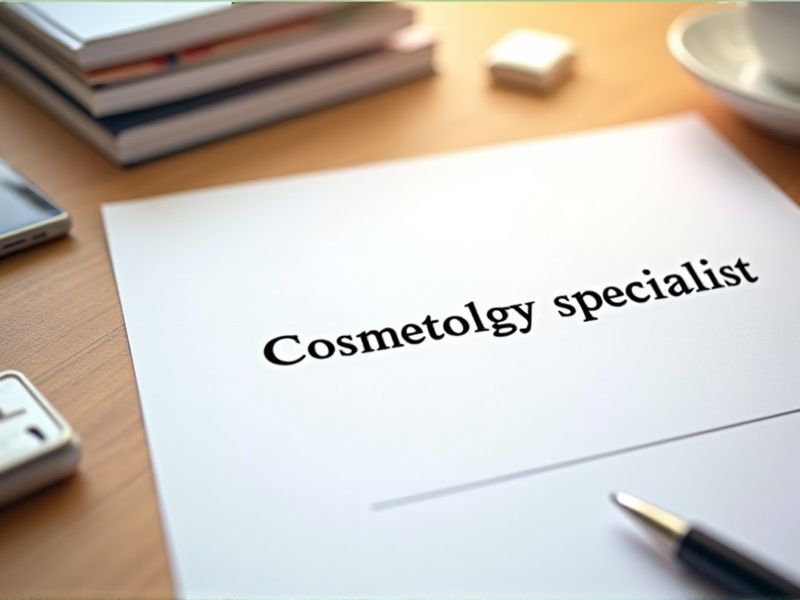
Cosmetology specialists require certifications to ensure they possess the necessary skills and knowledge to safely and effectively provide beauty services. These certifications serve as a benchmark for industry standards, protecting both the professional and the client. Regulatory bodies mandate certain credentials to uphold the integrity and quality of cosmetology practices. Some important certifications for a cosmetology specialist include those related to skin care, hair styling, and infection control.
State Cosmetology License
A State Cosmetology License ensures that cosmetology specialists meet specific education and training standards, upholding safety and professionalism in the industry. The licensing process involves passing exams that assess knowledge of sanitation, skin diseases, and proper techniques, crucial for protecting client health. State-regulated licensing helps maintain consistent industry standards, fostering consumer confidence and trust. Legal repercussions can arise for practicing without a license, emphasizing its necessity for legitimate business operations.
Esthetician License
A license ensures that a cosmetology specialist has met the education and training standards required for safe practice. Regulations mandate that estheticians understand hygiene, sanitation, and client safety to reduce health risks. Licensed professionals are equipped to handle various skin conditions and utilize treatments effectively. Clients often seek licensed estheticians for trust and assurance in the quality of service.
Nail Technician Certification
Obtaining a nail technician certification provides cosmetology specialists with essential knowledge about nail health and care, ensuring they can identify and address potential issues. The certification process typically covers hygiene and sanitation standards, crucial for preventing infections in clients. Certified professionals often gain a competitive edge in the job market, as they demonstrate recognized expertise. In many regions, legal regulations require certification to perform nail services, ensuring compliance with industry standards.
Makeup Artist Certification
Makeup artist certification equips cosmetology specialists with advanced skills and credibility in the beauty industry. Without certification, professionals may face limited opportunities and struggle to meet industry standards. Training through certification programs ensures that specialists stay updated on the latest trends and techniques. Hiring entities often prefer or require certified individuals, influencing job prospects and career advancement.
Barbering License
A barbering license is needed because it ensures that a cosmetology specialist possesses the necessary skills to perform haircuts and handle sharp instruments safely. It requires training in sanitation practices, reducing the risk of infections when working with clients. With this licensing, professionals demonstrate understanding of regulations that prevent malpractice. Obtaining a license also enhances credibility and trust among clients seeking grooming services.
Hair Color Specialist Certification
A Hair Color Specialist Certification equips cosmetology specialists with advanced knowledge of techniques and color theory, enabling them to provide superior services to clients. It enhances credibility and distinguishes them in a competitive market, attracting clientele seeking specialized color expertise. Continued education through certification can lead to proficiency in managing and correcting complex coloring issues, potentially reducing client dissatisfaction and rework. Specialist certification often results in higher earning potential due to the increased demand for skilled professionals in hair color services.
Salon Safety and Sanitation Certification
Ensuring salon safety and sanitation reduces the risk of infections and skin conditions for clients, thereby maintaining public health standards. Certification provides cosmetology specialists with the knowledge to properly disinfect tools and maintain cleanliness. Safe practices in salons lead to increased client trust and satisfaction, fostering repeat business and positive referrals. Compliance with safety standards can protect specialists from potential legal issues and financially damaging liabilities.
Advanced Skincare Certification
An Advanced Skincare Certification equips cosmetology specialists with updated knowledge on innovative skincare techniques and products. This certification enhances their ability to provide clients with safe and effective treatments. Specialized training differentiates professionals in a competitive market, potentially increasing clientele and revenue. Understanding advanced skincare contributes to better client education and trust, fostering long-term relationships.
Microblading Certification
Microblading certification equips cosmetology specialists with the necessary skills and techniques for precise and safe application, which reduces client risks. The certification process ensures practitioners understand hygiene and sanitation standards, essential for minimizing infection and complications. Certification can enhance a cosmetologist's credibility, attracting more clients through verified expertise. Regulatory boards often require certification to legally perform microblading, ensuring industry standards are met.
Salon Management Certification
Cosmetology specialists benefit from Salon Management Certification as it formalizes skills in business operations and client relationship management, leading to increased trust from clients and employers. This certification provides knowledge in financial planning and marketing strategies, essential for a salon's profitability and growth. With training in regulatory compliance, safety, and sanitation standards, a certified professional ensures a better workplace environment. Certifications often enhance career advancement opportunities and can result in a competitive edge when applying for management roles within the beauty industry.
Summary
When you obtain certifications as a cosmetology specialist, your credibility and marketability significantly increase. This credibility often leads to more job opportunities and higher earning potential in the beauty industry. Enhanced skills and knowledge gained from certification improve your service quality, which attracts a broader client base. In turn, client satisfaction and referrals rise, expanding your professional network and reputation.
